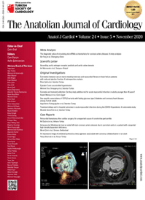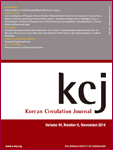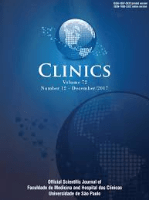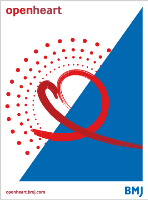
JRSM Cardiovascular Disease
Scope & Guideline
Empowering knowledge in the fight against cardiovascular disease.
Introduction
Aims and Scopes
- Clinical Cardiovascular Research:
Focuses on clinical studies that investigate various aspects of cardiovascular diseases, including treatment outcomes, patient management strategies, and the effectiveness of interventions. - Epidemiological Studies:
Explores the distribution and determinants of cardiovascular diseases in populations, aiming to identify risk factors and health disparities. - Innovative Diagnostic and Treatment Modalities:
Investigates new technologies, devices, and methodologies for diagnosing and treating cardiovascular conditions, including advanced imaging techniques and novel therapeutic approaches. - Health Promotion and Preventive Strategies:
Examines interventions aimed at preventing cardiovascular diseases and promoting heart health, particularly through lifestyle modifications and educational programs. - Multidisciplinary Approaches:
Encourages collaboration across various disciplines such as cardiology, surgery, radiology, and public health to enhance the understanding and treatment of cardiovascular diseases.
Trending and Emerging
- Integration of Technology in Cardiovascular Care:
There is an increasing focus on utilizing advanced technologies, such as telemonitoring, machine learning, and biomarker analysis, to enhance cardiovascular disease management and patient outcomes. - Impact of Comorbidities on Cardiovascular Health:
Research is increasingly examining how comorbid conditions, such as diabetes, HIV, and metabolic syndrome, influence cardiovascular disease progression and treatment efficacy. - Patient-Centered Outcomes and Quality of Life:
A growing emphasis on understanding health-related quality of life and patient-reported outcomes in cardiovascular disease management, particularly in vulnerable populations, is becoming prominent. - Causal Inference and Genetic Studies:
There is a notable trend towards employing methodologies like Mendelian randomization to establish causal relationships between risk factors and cardiovascular outcomes, enhancing the understanding of disease mechanisms. - Global Health Perspectives in Cardiovascular Disease:
Emerging research is increasingly addressing cardiovascular health in diverse populations, highlighting global disparities and the need for tailored interventions in different contexts.
Declining or Waning
- Traditional Risk Factor Analysis:
Research centered solely on traditional risk factors like hypertension, diabetes, and cholesterol levels has decreased, as there is a growing emphasis on more comprehensive and integrative approaches to cardiovascular risk assessment. - Case Reports:
The publication of individual case reports has waned, possibly due to a shift towards larger cohort studies and systematic reviews that provide more generalizable results. - Basic Mechanistic Studies:
Research focused primarily on basic science and mechanistic studies without direct clinical implications has become less prevalent, as there is a stronger push for translational research that connects laboratory findings to clinical practice. - Single-Disease Focus:
Studies concentrating exclusively on a single cardiovascular condition are declining, with a trend towards research that considers comorbidities and the broader spectrum of cardiovascular health.
Similar Journals

Anatolian Journal of Cardiology
Fostering Cardiovascular Excellence Since 2001.The Anatolian Journal of Cardiology, published by KARE PUBL, stands as a vital resource in the field of Cardiology and Cardiovascular Medicine. With an ISSN of 2149-2263 and E-ISSN 2149-2271, this Open Access journal has been fostering the dissemination of critical research since 2001, ensuring that high-quality content is freely available to a global audience. Based in Turkey, the journal aims to bridge gaps in cardiological knowledge through rigorous peer-reviewed articles that span a wide range of topics, from innovative clinical practices to groundbreaking research findings. While its current ranking places it in the Q3 category of cardiology journals, the Anatolian Journal of Cardiology continues to strive towards enhancing its impact, currently holding a Scopus rank of 236 out of 387. Researchers, practitioners, and students alike will find this journal an essential platform for keeping abreast of the latest developments in cardiovascular health.

Journal of Cardiology
Driving breakthroughs in heart health and patient care.Journal of Cardiology, published by ELSEVIER, stands as a prominent resource in the field of cardiology and cardiovascular medicine. With a rich history since its inception in 1987, this peer-reviewed journal aims to disseminate cutting-edge research that enhances the understanding and treatment of cardiovascular diseases. Its 2023 ranking places it in the Q2 category within its discipline, reflecting its significance and impact, as evidenced by a Scopus rank of #123 out of 387 journals, positioning it in the 68th percentile of its field. The journal is headquartered in Japan, providing a unique perspective on cardiological advances relevant not only to the Asian continent but also globally. Though it does not currently offer open access, the Journal of Cardiology remains a vital institutional resource for researchers, clinicians, and students seeking to push the boundaries of cardiovascular science and improve patient outcomes.

AMERICAN JOURNAL OF CARDIOLOGY
Driving Innovation in Heart Health and Clinical OutcomesThe American Journal of Cardiology is a leading peer-reviewed journal in the field of Cardiology and Cardiovascular Medicine, published by Excerpta Medica Inc-Elsevier Science Inc. Since its inception in 1958, the journal has consistently contributed to the advancement of cardiovascular research, providing a platform for groundbreaking studies and clinical findings that shape modern medical practices. With an impressive impact factor placing it in the Q1 category in its field for 2023, it ranks among the top journals in medicine, with a rank of #155 out of 387 in the Scopus database, reflecting its significance and rigorous editorial standards. The journal is committed to disseminating high-quality research that fosters innovation and enhances clinical outcomes in cardiology. Although it does not provide Open Access options, the American Journal of Cardiology remains an essential resource for researchers, healthcare professionals, and students looking to deepen their understanding of cardiovascular health.

Korean Circulation Journal
Connecting Researchers and Practitioners for Heart Health Advancements.Korean Circulation Journal, published by the Korean Society of Cardiology, has established itself as a prominent platform for disseminating research in the fields of Cardiology and Cardiovascular Medicine. With an ISSN of 1738-5520 and an E-ISSN of 1738-5555, this journal has been at the forefront of cardiovascular science since its inception in 2006 and is projected to continue until 2024. The journal's commitment to quality is reflected in its 2023 category quartiles, ranking in the second quartile (Q2) for both Cardiology and Internal Medicine, as well as its commendable Scopus rankings within the respective fields. Located in South Korea, the journal aims to bridge the gap between cutting-edge research and practical applications, serving as an invaluable resource for researchers, healthcare professionals, and students keen on advancing their understanding of cardiovascular health. Although currently not an open-access journal, it provides a wealth of knowledge that encourages evidence-based practice in clinical settings.

Cardiovascular Journal of Africa
Championing cardiovascular health for African populations.Welcome to the Cardiovascular Journal of Africa, an esteemed publication dedicated to advancing the fields of Cardiology and Cardiovascular Medicine. Established in 1994 and published by CLINICS CARDIVE PUBL PTY LTD, this journal serves as a vital platform for researchers, practitioners, and students interested in innovative cardiovascular research and clinical practice within the African context and beyond. With a Q3 ranking in both relevant categories as of 2023, this journal contributes significantly to the growing corpus of medical literature. Although access is non-open, the journal features a diverse array of peer-reviewed articles that explore groundbreaking findings and practical applications in cardiovascular health, fostering knowledge exchange among professionals. Situated in South Africa, the Cardiovascular Journal of Africa is not just a repository of academic research; it is a cornerstone in the fight against cardiovascular diseases, addressing the unique challenges faced by populations across the continent.

HEART AND VESSELS
Pioneering Research in Heart Health and Vascular FunctionHEART AND VESSELS is a prominent peer-reviewed journal published by SPRINGER, dedicated to advancing the fields of cardiology and cardiovascular medicine. With its ISSN 0910-8327 and E-ISSN 1615-2573, this esteemed journal encompasses a broad range of topics pertinent to heart health, vascular function, and associated therapies, making it an essential resource for researchers, clinicians, and healthcare professionals alike. Based in Japan and operating since 1985, HEART AND VESSELS has consistently maintained a Q2 ranking in the 2023 category quartiles, highlighting its relevance and impact in the cardio domain. Although it does not offer open access, the journal ensures high-quality publications that contribute significantly to the academic and clinical understanding of cardiovascular health. With over three decades of continuous scholarly contribution, HEART AND VESSELS serves as a vital platform for disseminating cutting-edge research and fostering innovative practices in the management of cardiovascular diseases.

International Cardiovascular Research Journal
Elevating cardiovascular research to new heights.International Cardiovascular Research Journal, published by Shiraz University Medical Sciences, serves as a vital platform for the dissemination of cutting-edge research in the field of cardiology and cardiovascular medicine. Since its inception in 2011, this journal has continuously devoted itself to promoting the highest quality of scholarly communication, helping to bridge the gap between laboratory findings and clinical application. With an ISSN of 2251-9130 and an E-ISSN of 2251-9149, it is indexed in prominent databases, contributing to its visibility and accessibility to a global audience. Although currently classified in the Q4 quartile in the 2023 rankings, the journal is committed to enhancing its impact factor and academic stature. It aims to facilitate open access for all published articles, although specific details on access options are pending. Through its rigorous peer-review process and diverse scope—which encapsulates advancements, clinical studies, and innovative therapeutic strategies—this journal fosters academic collaboration in the realm of cardiovascular health, making it an invaluable resource for researchers, practitioners, and students alike.

Clinics
Pioneering Discoveries in Diverse Medical DisciplinesClinics is a distinguished, peer-reviewed journal published by Elsevier España, focusing on the expansive field of medicine. Since its establishment in 1945, and transitioning to an open access model in 2005, the journal aims to disseminate high-quality research findings that contribute to the understanding of various medical disciplines. With an impressive impact factor reflected in its Q2 categorization within the miscellaneous medicine field and ranking as #124 out of 636 in general medicine according to Scopus, Clinics is recognized for its commitment to advancing medical knowledge. Researchers, healthcare professionals, and students will find invaluable insights into contemporary medical challenges and developments through its current publications extending until 2024. The journal is headquartered in Brazil, with its administrative office located at Calle de Zurbano, 76-4th Flr Left, Madrid 28010, Spain, reinforcing its strong academic presence in the international medical community.

Frontiers in Cardiovascular Medicine
Championing Breakthroughs in Heart Health Science.Frontiers in Cardiovascular Medicine is a leading open-access journal published by FRONTIERS MEDIA SA, dedicated to advancing research in the field of cardiology and cardiovascular medicine. Since its inception in 2014, the journal has become a vital platform for the dissemination of high-quality research, boasting a commendable Q2 rank in the 2023 category for Cardiology and Cardiovascular Medicine. With a focus on promoting innovative studies and clinical insights, Frontiers in Cardiovascular Medicine facilitates open access to its content, allowing researchers, healthcare professionals, and students from around the globe to engage with the latest findings which are critical for the advancement of cardiovascular health. The journal's significant presence in the academic landscape, as indicated by its Scopus ranking (161/387 and 58th percentile), underscores its importance as a research outlet in this essential field. Located in Lausanne, Switzerland, the journal continues to support the global cardiovascular community by encouraging collaboration and knowledge sharing to address the challenges faced in cardiovascular medicine today.

Open Heart
Unlocking the Heart of Cardiovascular ResearchOpen Heart is a prestigious, peer-reviewed open access journal published by BMJ Publishing Group, focusing on the dynamic field of Cardiology and Cardiovascular Medicine. Launched in 2013, the journal has rapidly ascended to prominence, achieving a Q1 quartile ranking in its category as of 2023, reflecting its high-quality scholarly contributions. With an active publishing history from 2014 through 2024, Open Heart offers an expansive platform for researchers, clinicians, and students to disseminate and access groundbreaking research findings, reviews, and case studies that address critical issues in cardiovascular health. The journal is indexed in Scopus, ranking 133rd out of 387 in the Medicine - Cardiology and Cardiovascular Medicine category, placing it within the 65th percentile of its peers. Based in the United Kingdom, it promotes global research and collaboration in the cardiovascular domain, ensuring open access to vital knowledge for all stakeholders in the medical community. For access options and more information, visit the Open Heart website.